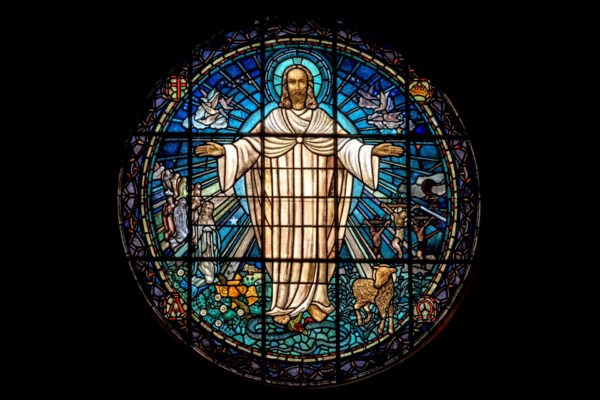In 1 Corinthians 7:25-31 Paul provides us with three clues that help us understand the reason for his advice to the Corinthians of living faithfully in light of the times: the “present distress” (26), “the appointed time has grown very short” (29), and “the present form of this world is passing away” (31). However, these reasons are as mysterious as they are significant. They have largely been a source of frustration, confusion, and embarrassment for readers who think Paul is talking about the second coming of Christ and the end of the world as we know it. What are we to make of Paul’s language? Is he talking about the end of the world? What did it mean for the Corinthians living in the first century, and what does it mean for those who are (still) eagerly awaiting the return of our King?
The Present Distress
Regarding the betrothed Paul writes, “I think that in view of the present distress it is good for a person to remain as he is” (1 Cor. 7:26). Hard times and calamity were just over the horizon for the Corinthians, if not already upon them, and those who marry would have worldly troubles (1 Cor. 7:28). Some think Paul is referring to a period of great tribulation immediately preceding the second coming of Christ. However, the word “distress” is never used in Scripture to describe events surrounding the second coming. Furthermore, Paul is only giving his opinion on a present or impending situation; he is not suggesting people remain unmarried until Christ returns. A better option is that the Corinthians were likely facing famine, not the end of the world. Bruce Winter writes, “There is firm archaeological and literary evidence which indicates that there had been food shortages in Corinth during this period [40s-50s]. These were inevitably accompanied by panic buying and riots because of social unrest and uncertainty about the future…Tacitus also records earthquakes and famines.”1Bruce Winter, “1 Corinthians,” in New Bible Commentary: 21st Century Edition, ed. D. A. Carson et al., 4th ed. (Leicester, England; Downers Grove, IL: Inter-Varsity Press, 1994), 1170–1171.
If so, then the “present distress” fits perfectly into series of the events that Jesus predicted would occur within a generation, namely the destruction of Jerusalem and the end of the “old covenant order.” It was a crisis that spilled into the entire known world and produced distress for the church. Jesus predicted earthquakes and famines as the “beginning of the birth pains (Mark 13:8), and that it would be difficult for pregnant and nursing mothers (Mark 13:17), which lines up with Paul advising virgins to remain unmarried. In fact, Jesus uses the same word “distress” in his Olivet discourse, not to describe the second coming, but the fall of Jerusalem in 70 AD:
“when you see Jerusalem surrounded by armies, then know that its desolation has come near. Then let those who are in Judea flee to the mountains, and let those who are inside the city depart, and let not those who are out in the country enter it, for these are days of vengeance, to fulfill all that is written. Alas for women who are pregnant and for those who are nursing infants in those days! For there will be great distress upon the earth and wrath against this people…” (Luke 21:21-23)
This is precisely what Charles Hodge points out in his commentary on 1 Corinthians: “The awful desolation which was soon to fall upon Jerusalem…and the inevitable struggles and persecutions which, according to our Lord’s predictions, his followers were to encounter, were surely enough to create a deep impression on the apostle’s mind, and to make him solicitous to prepare his brethren for the coming storm.” Yes, Paul was writing to those living in Corinth, but the famines, earthquakes, and persecution that preceded the fall of Jerusalem impacted the entire known world at the time. If they were in the middle of a crisis, then getting married and taking on additional and significant responsibilities would not be the wisest idea. So, Paul advises them to not take on the additional strife. Leon Morris summarizes it well: “When high seas are raging it is no time for changing ships.2Leon Morris, 1 Corinthians: An Introduction and Commentary, vol. 7, Tyndale New Testament Commentaries (Downers Grove, IL: InterVarsity Press, 1985), 115.
The Appointed Time Has Grown Very Short
In 1 Corinthians 7:29-31 Paul unpacks what he means about the present distress with two more supposed “end time” phrases. These are parallel phrases that describe the same reality in different ways. First, Paul says “the appointed time has grown very short” (29). In the NT the word for “appointed time” (kairos) is used to refer to the new and unique season of time that has dawned with the coming of Jesus (Mark 1:15). “With the life and especially the death and resurrection of Jesus, the old age has passed away, and a new epoch, the fulfillment of the times, has dawned.”3Christopher A. Beetham, ed., “Καιρός,” in Concise New International Dictionary of New Testament Theology and Exegesis (Grand Rapids, MI: Zondervan Academic, 2021), 426. And Paul says this appointed time has been shortened, “gathered in,” or “compressed.” Gordon Fee puts it this way: “The future, which was set in motion by the event of Christ and the Spirit, has been ‘shortened’ so that it is now in plain view. And that will absolutely condition how one lives in the present.”4Gordon D. Fee, The First Epistle to the Corinthians, ed. Ned B. Stonehouse et al., Revised Edition, The New International Commentary on the New Testament (Grand Rapids, MI; Cambridge, U.K.: Eerdmans, 2014), 374.
Understood this way, Paul is not saying “you don’t have much time left on this earth.” He is not primarily concerned with how much time is left before the end of the world and Christ returns in glory. Rather, he is more concerned with how time has changed and how we live in light of it. The emphasis seems to be more so on the quality of time, not simply quantity of time. This helps us better understand what the NT authors mean when they talk about “the last days,” which began at Pentecost (Acts 2:17). Yes, we are in the final stretch of history before Christ returns and is revealed in all his glory, but the future outcome of the world has been made clear because of the gospel, and this explains why Paul proceeds to give advice on how to live “from now on.”
The Present Form of This World Is Passing Away
Because the time has grown short, he gives a second reason that expands on this idea: “the present form of this world is passing away” (1 Cor. 7:31). The Bible does not teach that our world be destroyed but restored, made new, and glorified. Thus, Paul says that the present configuration of the world, the world as we know it, is passing away (Heb. 8:13; cf. 2 Cor. 5:17). In other words, Paul, like Jesus in his Olivet Discourse, are not so much concerned with the end of the world, but the end of a world. This is what New Testament eschatology is all about. The old world and covenant order, with Jerusalem and the temple at its center, is passing away, and the new creation has already broken into the present age. The life of the age to come has already begun to dawn with the death, resurrection, exaltation of Jesus Christ, and the outpouring of the Holy Spirit.
Because the time has been shortened and the present form of the world is passing away, we must live in light of this new understanding of time. We must live with a radically new understanding of our relationship to this world, what matters, and what does not. When we understand Paul this way, we can make sense of his instructions in verses 29-31. Five times Paul says we are to live “as if not.” Paul is clearly not saying live with disregard for your spouse, to live without joy or mourning; Paul is not saying “do not buy or sell or make use of the world.” Rather, live as though marriage is not the ultimate eternal thing; your ultimate joy is in Christ. Live as those who mourn in hope of the new creation. Rejoice like those who know the things in this life are not ultimate things. Live like those who know earthly possessions are not lasting. Do not buy to possess and obsess over like the world does. Do not be absorbed in or distracted by the world. This tracks with what the apostle John instructed the church: “Do not love the world or the things in the world. If anyone loves the world, the love of the Father is not in him…17 And the world is passing away along with its desires, but whoever does the will of God abides forever. Children, it is the last hour…” (1 John 2:15-17).
Conclusion: Living in Light of the Times
In 1 Chronicles 12:32 we learn that the sons of Issachar were “men who had understanding of the times, to know what Israel ought to do” (1 Chron. 12:32). These mighty men who served king David knew how to live in light of the times, and this is precisely Paul’s point for the Corinthians. When we put these phrases together (1 Cor. 7:26, 29, 31), we see that Paul understands the present distress as part of and a type of the distress that characterizes the last days which Jesus inaugurated, and which we are currently living. Alastair Roberts’ summary is helpful: “Paul’s concern seems to be less with preparing the Corinthians for the end of all things than with sparing them from the greater pressures and worries that would afflict those whose embeddedness in the collapsing order was exacerbated by marriage or many possessions.” This means that, even if we are not living in the middle of a world-ending crisis, or at the end of the world, our goal should be living faithfully for Jesus without anxiety or distraction.
As we wait patiently for the return of our King, as we face distress and worldly troubles, may we “occupy” without becoming “preoccupied” with the world. As citizens of the heavenly Jerusalem who are waiting for that kingdom to arrive in its fullness, may our minds not be set on earthly things (Phil. 3:18-20). Let us remember the season in which are living, a season where Christ is ruling in the midst of his enemies. Let us live in light of the Light that has dawned and broken into the present age, knowing that the old is passing away, and Jesus is making all things new.




